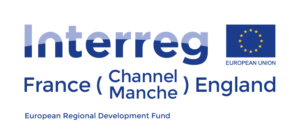ADAPT – Assistive Devices for empowering disAbled People through robotic Technologies
The project started in January 2017 and is co-financed by the European Regional Development Fund within the framework of the INTERREG VA France (Channel) England programme. The ADAPT project includes 16 partner organisations and focuses on developing technological innovations for the welfare, quality of life, well-being, home care and independent living for people with severe disabilities. ADAPT is also concerned with the training of healthcare professionals in the use of Assistive Technology solutions. Finally, ADAPT is focused on the mapping of stakeholders and the setting-up of events for enhancing the promotion of the results and their sustainability.
Project duration: January 2017 to June 2022
Project funding: Total budget: € 8.7 Million, ERDF amount: € 5.9 Million
Project Objectives and Expected Outcomes
The ADAPT project focuses on developing innovative assistive technologies for people with severe cognitive and physical disabilities which have the potential to enhance quality of life by promoting independence, mobility and social inclusion. Specifically, to develop:
- a smart and connected Electrical Powered Wheelchair (EPW) to compensate for user disabilities through driving assistance technologies and report users’ health through connection with Internet. This system will benefit severely disabled users and enable health professionals to monitor changes in user health.
- An EPW Simulator platform using virtual reality. This will give the user an immersive experience of the Smart and Connected EPW and train them to drive in everyday life. Professionals will assess the suitability of the EPW for particular patients and environments and gain understanding of the user perspective.
- Training of healthcare professionals in AT/SAR. This novel training provision addresses a gap in the current healthcare education. Project platforms will be captured in training protocols for the benefit of users and healthcare providers.
- Formalized agreements between research institutions and companies built through 20 events ranging from local to international meetings for promoting and disseminating ADAPT’s results, creating synergies, identifying points of convergence for common studies so as to boost R&D and favour the spread of innovative ADAPT’s AT/SAR to the market.
University of Kent Contribution and Team
The team at the University of Kent is primarily involved in the development and construction of the wheelchair and the virtual reality simulator platform.
Team members:
Konstantinos Sirlantzis, Matthew Pepper, Gareth Howells, Chee Siang Ang, Alexandra Covaci, Christos Efstratiou, Steve Kelly
Partners
ESIGELEC (Lead partner)
Institut National des Sciences Appliquées de Rennes, Health and Europe Centre, East Kent Hospitals NHS Foundation Trust, Ergovie, Pole Saint Helier, Cornwall Mobility, Kent Surrey Sussex Academic Health Science Network, University College London, Breizh Paralysie Cérébrale, Université de Picardie Jules Verne, Canterbury Christ Church University, Pole Transactions Electroniques Sécurisées, University of Kent, Centre Hospitalier Universitaire – Hôpitaux de Rouen, Plymouth Hospitals NHS Trust


